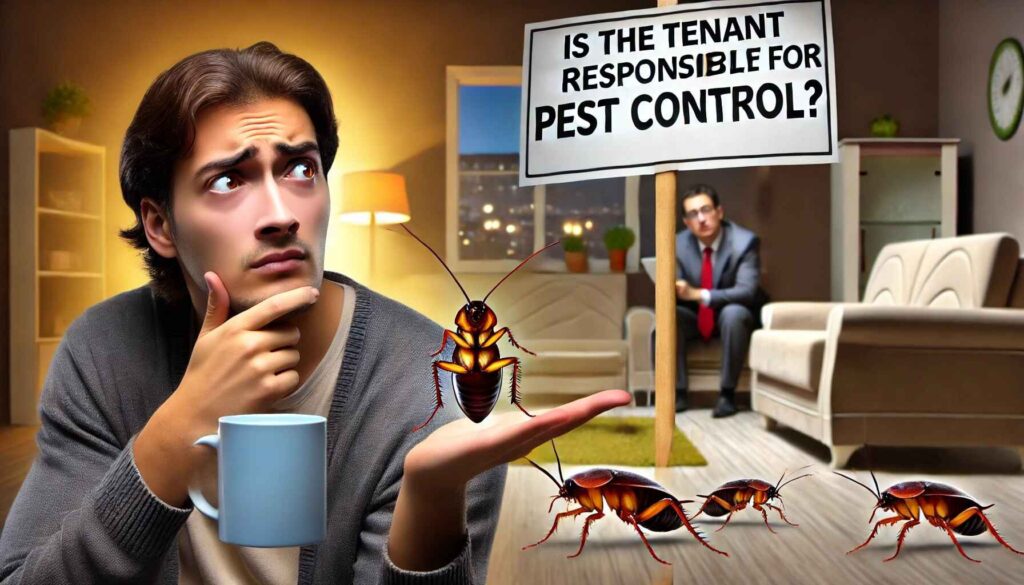Is the tenant responsible for pest control? This is a common question that many renters and landlords face, especially when unwanted pests like rodents, bedbugs, or cockroaches invade a property. Both parties often wonder who should bear the cost and responsibility for eliminating these nuisances. Whether you’re a landlord or a tenant, understanding the legal obligations and practical responsibilities is crucial for ensuring a pest-free living environment. Let’s explore the details about the query, Is the tenant responsible for pest control, so you can clearly understand where the responsibility lies and what steps both parties can take.
Understanding Pest Control in Rental Properties
Pests can pose significant health risks and damage to property, making pest control an essential part of maintaining a rental. The question Is the tenant responsible for pest control is central to any tenant-landlord relationship, and it’s essential to understand the legal framework.
Common Pests in Rental Properties
Here’s a look at some of the most common pests tenants might encounter:
- Rodents (e.g., mice and rats)
- Bedbugs
- Cockroaches
- Termites
- Ants and flies
Each pest requires specific control methods, and different jurisdictions may have distinct regulations regarding who is responsible for handling them.
Who is Legally Responsible for Pest Control?
Understanding the legal framework around pest control in rental properties is crucial for both landlords and tenants. Both parties have certain obligations when it comes to dealing with pests, but the responsibilities often depend on the circumstances surrounding the infestation. For example, is the tenant responsible for pest control?
Landlord’s Responsibilities
Generally, landlords are responsible for ensuring that their rental properties meet essential health and safety standards, which includes keeping the property free from pests.
- Habitability laws: Most states have laws that require landlords to provide a habitable living environment. If pests are a part of the problem, the landlord is responsible for eliminating them.
- State and local laws: Local laws may also dictate specific pest control measures. Landlords often must take proactive steps, such as regular inspections or pest control treatments.
For instance, if tenants experience a rodent infestation, is a landlord responsible for mice? Yes, the landlord is typically required to handle rodent problems that arise due to structural deficiencies in the property. Similarly, are landlords accountable for bed bugs? or still have confusion, is the tenant responsible for pest control? So, the answer is yes, the landlord is responsible if the infestation occurs before the tenant moves in.
Key points to remember:
- Pest control apartment laws dictate that landlords must address pest issues before the tenant moves in.
- Landlords are often required to deal with infestations that occur due to structural problems.
- If the infestation is linked to a tenant’s actions, the responsibility might shift.
Tenant’s Responsibilities
While the landlord is generally responsible for dealing with pest infestations, tenants also play an important role in keeping the rental property pest-free.
- Preventative care: Tenants should be proactive in maintaining cleanliness, which includes avoiding food spills, sealing cracks, and preventing easy access points for pests.
- Reporting pest problems: Tenants are typically required to inform landlords as soon as they notice a pest problem. This allows the landlord to address the issue before it escalates.
Key tenant duties:
- Maintain cleanliness, especially in food storage and waste disposal areas.
- Report pest sightings immediately.
- Ensure that the apartment is secure, preventing pests from entering.
What to Do If Pest Control Responsibility is Unclear
If there is uncertainty about who is responsible for pest control, both tenants and landlords should take the following steps to resolve the situation.
Steps for Tenants:
- Review the lease agreement: Check for clauses related to pest control and maintenance responsibilities.
- Document the issue: Take pictures and keep a record of pests, especially if the infestation is large.
- Notify the landlord immediately: Contact the landlord and provide clear details about the pest issue.
Steps for Landlords:
- Act quickly: If a tenant reports a pest problem, respond promptly to investigate and treat the issue.
- Clarify the lease terms: Ensure that the lease agreement specifies which party is responsible for pest control.
- Maintain the property: Regularly inspect the property for any signs of pests and repair any structural issues that could lead to infestations.
Legal Recourse for Tenants
If a landlord does not address a pest issue promptly, tenants may have legal options. Understanding tenant rights is crucial when dealing with a pest infestation.
- Withhold rent: In some cases, tenants may be allowed to withhold rent until the landlord resolves the issue. However, tenants should always seek legal advice before taking this step.
- File a complaint: If the landlord fails to act, tenants can file a complaint with local health or housing authorities.
- Take legal action: If necessary, tenants can take the landlord to court to force them to make the repairs and treat the pest problem.
Preventative Measures for Renters and Landlords
Both parties can take steps to prevent pest infestations before they become a problem.
For Tenants:
- Clean regularly: Keep food in sealed containers and regularly clean kitchen areas.
- Seal entry points: Close any cracks or holes in doors and windows that pests could use to enter.
- Promptly report pest sightings: Early detection is key to preventing an infestation from spreading.
For Landlords:
- Conduct regular inspections: Schedule regular pest control treatments and building inspections.
- Seal the property: Ensure all cracks, crevices, and entry points are sealed to prevent pests from entering.
- Communicate with tenants: Provide tenants with guidelines on pest prevention and expectations for cleanliness.
How Long Does a Landlord Have to Get Rid of Roaches?
Roaches are one of the most common pests in apartments. But how long does a landlord have to get rid of roaches once notified? Pest control apartment laws vary, but landlords generally must address a roach problem within a few days to a couple of weeks.
- Landlord’s Timeline: Typically, landlords must address pest issues like roaches within 7 to 14 days.
- Tenant Action: Tenants should promptly report any sightings and give the landlord a reasonable amount of time to resolve the problem.
If the landlord fails to act in a timely manner, tenants can seek legal remedies, including withholding rent or filing a complaint with local health departments.
How Long Does a Landlord Have to Fix a Rodent Problem?
When dealing with a rodent problem, landlords must act quickly due to the health risks associated with rodents. If rats or mice infest your rental unit, the landlord is responsible for fixing the issue.
Timeline for Rodent Control:
| Pest Issue | Action Timeline | Landlord Responsibility |
|---|---|---|
| Rodents | 1 to 2 weeks | Must act within this time frame to resolve rodent infestations. |
If the landlord fails to take action, tenants can report the problem to local housing authorities or even take legal action.
Is a Landlord Responsible for Mice?
Yes, landlords are responsible for mice infestations. While tenants should maintain cleanliness, mice often enter apartments through structural defects like gaps in walls or around windows. In these cases, it’s the landlord’s responsibility to fix the building and address the infestation.

A tenant with pest spray, confused about handling pest control.
- Landlord’s Duty: The landlord must seal entry points, ensure the building is properly maintained, and address any pest problems that arise from structural defects.
- Tenant’s Duty: Tenants should report the issue promptly and maintain a clean living environment to avoid attracting rodents.
Can I Refuse Pest Control in My Apartment?
The answer depends on the situation, but refusing pest control treatment isn’t usually a good idea. While tenants technically have the right to refuse pest control in their apartment, refusing treatment can lead to further issues. If you refuse pest control services, you might allow the infestation to worsen, potentially violating your lease agreement or health codes.
In most cases, pest control is part of the landlord’s responsibility when the issue goes beyond what a tenant can handle. However, if you’re concerned about specific pest control methods (e.g., pesticides), it’s a good idea to discuss alternatives with your landlord rather than refusing outright.
Is Pest Control Considered Maintenance?
Yes, pest control is often considered part of regular maintenance. Many landlords are required by law to provide pest control services, particularly when dealing with significant infestations like rodents or bed bugs.
- Routine Maintenance: In many cases, pest control is included as part of routine maintenance, which is the landlord’s responsibility to maintain a pest-free living environment.
- Major Infestations: When a significant pest issue arises (like rats or bed bugs), the landlord must take prompt action to resolve the problem, often at their own expense.
If pests are caused by tenant negligence, such as leaving food exposed or not taking out trash, the tenant may be required to handle pest control at their own cost.
Are Landlords Responsible for Bed Bugs?
Yes, landlords are responsible for bed bugs in rental units. Bed bugs are challenging to control, and they often spread between units. When a tenant reports a bed bug infestation, the landlord is typically responsible for covering the cost of treatment.
- Landlord’s Responsibility: If bed bugs are discovered, landlords must hire professionals to eliminate the infestation and may be required to provide temporary housing during the treatment.
- Tenant’s Responsibility: Tenants should report the issue immediately and follow any preparation guidelines provided by pest control professionals.
Conclusion
Is the tenant responsible for pest control in a rental property depends on various factors, including the nature of the infestation and the actions of both parties. Generally, landlords are responsible for maintaining a pest-free environment, especially if the pests were present before the tenant moved in or are due to structural problems. Tenants also have a role to play by keeping their living spaces clean and reporting pest problems promptly. By understanding your rights and responsibilities, you can ensure a healthier living environment, free from pests and disputes.
- Also read: 42.921.663 | Learn All About It






